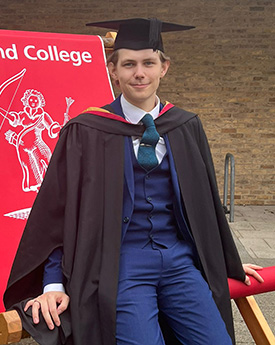Dr Dmitry Zmeev
Senior Lecturer and EPSRC Research FellowProfile
I am a low-temperature physicist studying macroscopic quantum phenomena and I work at the Ultralow Temperature Physics laboratory (ULT).
Our laboratory is equipped with an array of nuclear demagnetisation refrigeration facilities, each boasting world-leading capabilities. Our team’s proficiency in designing ultralow temperature experiments, coupled with our extensive range of cutting-edge instrumentation, empowers us to conduct research at the very frontiers of physics by pushing physical systems to their limits, where new physics is possible. Our research portfolio is diverse and groundbreaking, encompassing areas such as topological superfluidity, far-from-equilibrium quantum phenomena, dark matter search, and simulators of the early universe.
PhD Supervision Interests
1. Flight in superfluids
The project is to create and perform experiments with new types of superconducting probes for quantum liquids: precisely controllable levitators working at sub-millikelvin temperatures. Recently we have made a significant progress in the development of these instruments and we will explore several outstanding problems.
Firstly, pinning and nucleation of quantum vortices in superfluid helium-4. Currently, there are two contradictory pictures of how quantum vortices attach (‘pin’) to surfaces and how it affects their motion. A levitating sphere offers a new type of experimental topology and has the power to resolve this issue.
Secondly, the question of existence of a lift force in a superfluid remains open. We will build a hydrofoil, move it through superfluid and observe whether the lift exists.
Thirdly, the surface-bound states in superfluid helium-3, the coldest liquid in the Universe, at microkelvin temperatures represent a largely unexplored physical system with potentially extremely unusual properties. We have recently demonstrated how to probe this system by driving it out of equilibrium, and the new instruments promise to enhance our capabilities.
2. Superfluid 3He as an instrument for fundamental physics
We are seeking PhD students to join our team in building and implementing experiments at temperatures significantly below one millikelvin. Our current projects include using superfluid 3He as an instrument for fundamental physics: a dark matter detector and a simulator of the early universe.
The detector will use an ultrasensitive superfluid 3He calorimeter and superconducting transition edge sensors for achieving a high resolution in detecting spin-dependent interactions between 3He nuclei and hypothetical dark matter particles.
The simulator will probe the dynamics of phase transitions between two superfluid states in 3He, which is found to be of surprising similarity to the hypothetical phase transitions in the quantum vacuum of the early universe. The results of the experiments will inform the interpretation of the gravitational wave signatures from processes that took place shortly after the Big Bang.
-
Creation and evolution of quantum turbulence in novel geometries
23/01/2023 → 22/01/2027
Research
-
LANCQTFP: Quantum Enhanced Superfluid Technologies for Dark Matter and Cosmology
01/12/2020 → 31/03/2025
Research
-
H2020 : European Microkelvin Platform (EMP)
01/01/2019 → 31/12/2023
Research
-
Workshop on non-autonomous oscillatory systems and their applications in the life sciences
01/06/2018 → 30/11/2019
Research
-
Superfluid 3He Far from Equilibrium
01/07/2017 → 31/01/2023
Research
-
Crystalline Defects and Possible Superfluidity in Solid Helium
01/01/2010 → 30/06/2013
Research
Science Community Day
Festival/Exhibition/Concert
Carlos Uriarte Gonzalez
Hosting an academic visitor
Royal Society Summer Science Exhibition 2024: A quantum view of the invisible universe
Festival/Exhibition/Concert
Science Community Day
Festival/Exhibition/Concert
Investigating Steady and Oscillatory Flows in Helium Using a Superconducting Levitation System
Invited talk
Investigating Steady and Oscillatory Flows in Helium Using a Superconducting Levitation System
Invited talk
Carlos Uriarte Gonzalez
Hosting an academic visitor
M Arrayás
Hosting an academic visitor
M Arrayás
Hosting an academic visitor
Sacha Soulerin
Hosting a Student (Masters)
Superconducting Nano-oscillators Fabricated with Wire Drawing Technology
Invited talk
Dynamics of quasiparticles in the surface-bound two-dimensional superfluid 3He
Oral presentation
Carlos Uriarte Gonzalez
Hosting an academic visitor
EMP user meeting 2022
Participation in conference -Mixed Audience
M. Arrayas
Hosting an academic visitor
Jose Luis Trueba
Hosting an academic visitor
ULT2022 Ultra Low Temperature Physics 2022
Participation in conference -Mixed Audience
Dynamics of quasiparticles in the surface-bound two-dimensional superfluid 3 He
Oral presentation
WOMAD Festival 2022, World of Music, Arts and Dance
Festival/Exhibition/Concert
Carlos Uriarte Gonzalez
Hosting an academic visitor
QFS 2021
Participation in conference -Mixed Audience
Condensed Matter and Quantum Materials
Participation in conference -Mixed Audience
APS March Meeting
Participation in conference -Mixed Audience
UK Quantum Fluids Network (External organisation)
Membership of network
MSc internal examiner
Examination
WOMAD Festival, World of Music, Arts and Dance
Types of Public engagement and outreach - Festival/Exhibition
Continuous Professional Development event for physics teachers
Participation in workshop, seminar, course
Driving commercial and public engagement with ultralow-temperature technologies
Other
IOP Low Temperature Techniques Course
Participation in workshop, seminar, course
Condensed Matter and Quantum Materials
Oral presentation
International Conference on Quantum Fluids and Solids 2019
Participation in workshop, seminar, course
Workshop on non-autonomous oscillatory systems
Participation in workshop, seminar, course
Symposium on Quantum Fluids and Solids 2018, Tokyo
Invited talk
Workshop on Unconventional Superfluids
Invited talk
External Assessor of MSci thesis
Examination
Pre-examiner PhD
Examination
The Annual General Meeting of the Low Temperature Group of the IOP
Oral presentation
Superfluid 3He Far from Equilibrium
Fellowship awarded competitively
Bristol Science Film Festival
Prize (including medals and awards)
2019 Research Highlights: top research that made an impact
Other distinction
Vienna Science Film Festival
Prize (including medals and awards)
Poster prize and Conference Highlight
Prize (including medals and awards)
Low Temperature Physics
Low Temperature Physics
Low Temperature Physics, Quantum Nanotechnology
- Low Temperature Physics




